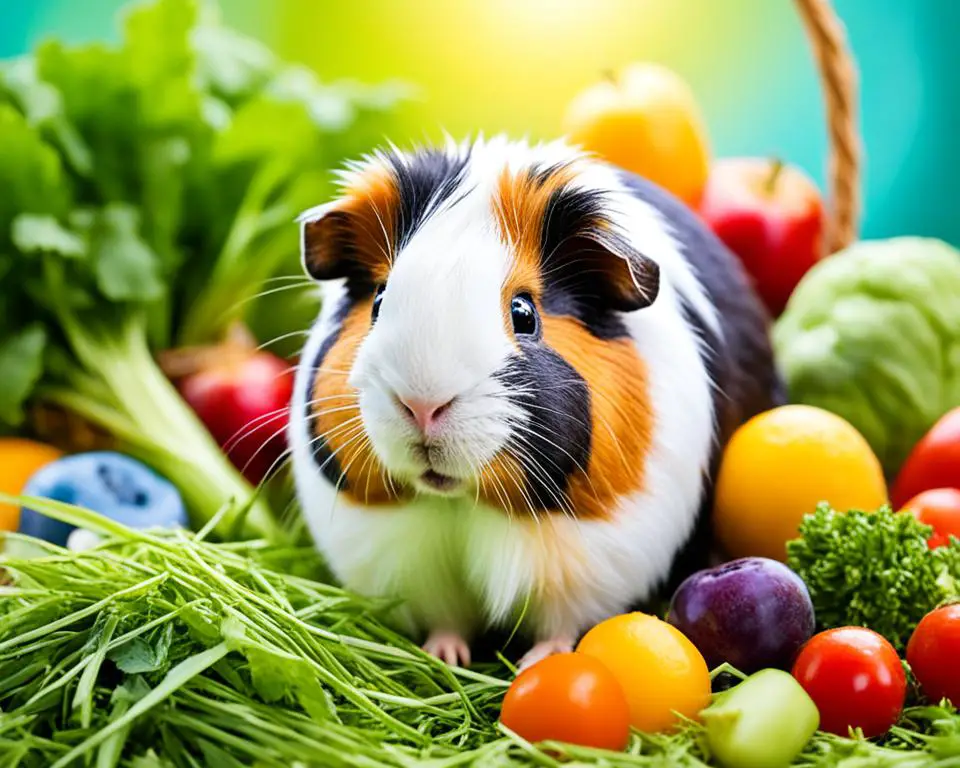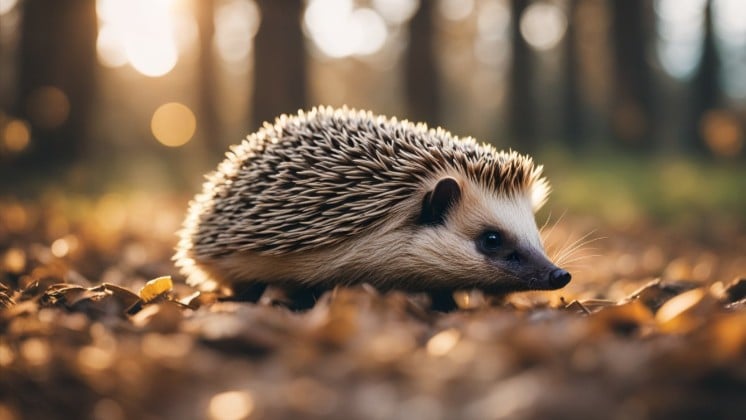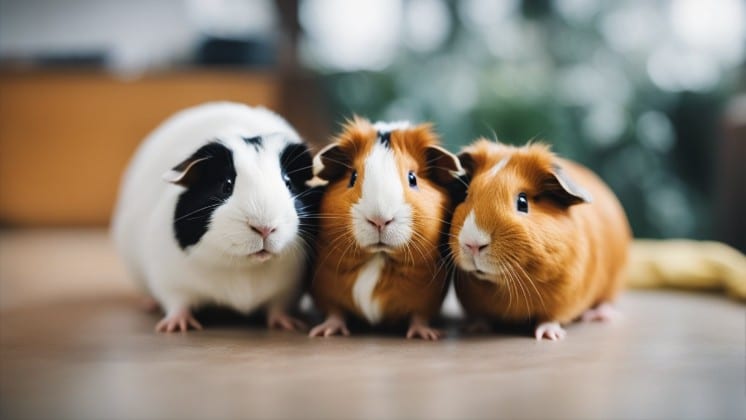Guinea pigs are a very popular pet, especially among young families. However, if you have a few pet guinea pigs, you might wonder whether guinea pigs can become cannibals, especially if you have young children who would struggle to understand.
In this article, we’ll learn about the different situations where your guinea pig might be prone to cannibalism and what you can do to help reduce the risk of cannibalism among your guinea pig herd.
Are guinea pigs cannibals?
Guinea pigs are herbivores and not usually cannibals. However, in rare instances where they are extremely stressed, malnourished, or lacking certain nutrients, they may exhibit cannibalistic behaviors.
It is crucial to provide proper care, a balanced diet, and a stress-free environment to prevent such behavior in guinea pigs.
Do guinea pigs eat their babies?
Sadly, there are a few situations where guinea pigs might eat their babies. Firstly, giving birth can be a stressful or traumatic experience for the female guinea pig (sow).
A particularly difficult labor could make anxiety particularly high, and a stressed guinea pig is much more likely to eat their young.
Note: It’s also been known that a mother guinea pig will eat the weaker babies in the litter to reduce the demand on her as a mother and prevent small, weak, or deformed babies from attracting the attention of predators and endangering the entire herd.
Another situation where your guinea pig might eat their young is If you touch them. Baby or newborn animals are really cute, and it might be really tempting, especially for young children, to try to pick them up and handle them.
Sadly, once your scent is transferred onto a baby guinea pig, the mother is likely to eat it through stress and to reduce the risk of attracting predators.
Do you have to separate male guinea pigs from baby guinea pigs?
Separating baby guinea pigs and their mother from other adult guinea pigs, especially males, is really important. But what about the father of the babies? Does he need to be separated? The answer is yes.
Male guinea pigs (boars) will usually attempt to mate the sow almost immediately after she’s given birth. Sadly, he may attack or eat any babies in the way.
Equally, the presence of the boar may make the sow anxious, especially since she’ll have recently been through the stress of the birthing process. If the boar is coming closer and making her feel uncomfortable and panicked, she may resort to cannibalism.
Do guinea pigs eat each other when they die?
Depending on the circumstances, a guinea pig may eat another guinea pig after they die. It all depends on the availability of food and the level of overcrowding. If the guinea pigs can’t get all the nutrition they need, they may sadly eat a dead pig.
Can guinea pigs become cannibals if they are depressed?
Issues like stress and depression may make it more likely that a guinea pig will develop cannibalistic tendencies. Depression may make them more irritable and more likely to fight, which could exacerbate stress too.
It is also important to note that while there has been increased research into the mental health of small animals such as guinea pigs, experts still don’t fully understand why some may exhibit abnormal behavior.
Common causes include boredom, an unhealthy diet, and lack of exercise. Therefore it’s best to avoid any potential situation that could cause your pet distress and consider taking them to a veterinarian if you suspect any behavioral issues requiring professional attention.
Causes of cannibalistic behavior in guinea pigs
Cannibalism among guinea pigs is rare. However, it may still occur in certain situations. If a guinea pig finds itself in an environment with inadequate food or water supply, it may resort to cannibalistic behavior to survive.
Stress and anxiety
Stress and anxiety are two of the most common triggers of cannibalistic behavior in guinea pigs. Overcrowding, inadequate resources, or human interaction can cause stress. In these cases, a guinea pig may become overly stressed and eat other guinea pigs.
Anxiety is another factor that can lead to cannibalism in guinea pigs. If a guinea pig feels anxious, it may resort to aggressive behavior, including cannibalism.
Lack of nutrition
Lack of nutrition is a serious problem for guinea pigs, leading to physical and mental health issues. Without proper food and water sources, the body can become weak and malnourished. This can result in lethargy, depression, and even cannibalism in extreme cases.
To ensure your pet remains healthy and happy, always provide them with a balanced diet of fresh vegetables and hay. Keeping the cage clean and free from debris will also help prevent malnutrition. Additionally, ensure they have access to plenty of clean drinking water.
If you notice any signs of malnutrition in your guinea pig, speak with a veterinarian as soon as possible for the best treatment plan.
Unfavorable living conditions
Unfavorable living conditions can be a major factor in causing cannibalistic behavior in guinea pigs. Unfavorable living conditions can include overcrowding, inadequate resources, lack of proper nutrition, and poor hygiene. Overcrowding causes increased stress levels, leading to aggressive behavior and cannibalism.
Can starvation cause guinea pig cannibalism?
Starvation and demand for other resources caused by overcrowding can lead to cannibalism. In fact, if a mother has a litter of babies and knows that the litter is too large to survive because there is a lack of food, she may eat some of them so that the others survive.
Of course, this might seem harsh, but it’s her instinct and part of the natural world.
How can you prevent cannibalism?
Thankfully, there are a few things you can do to help prevent cannibalism among your guinea pigs:
- Ensure that the size of the enclosure and housing is appropriate for the number of guinea pigs you own. Don’t be tempted to take on one or two more unless you have the space to do so without it being overcrowded.
- Provide multiple feed and water stations to prevent competition for food.
- Provide fresh food regularly so that demand isn’t so intense.
- Ensure you have plenty of hides, shelters, and cozy spaces so that your guinea pigs don’t have to compete for somewhere to rest or feel safe and secure.
- Separate male guinea pigs from babies for at least a week.
- Avoid handling baby guinea pigs for at least 10-14 days to avoid transferring your scent and causing stress.
- Separate any guinea pigs that are being bullied, fighting, or seeming depressed. They may be happier in a different environment with a new buddy.
Summary
Before we move on to the conclusion, we’ve summarized this article into a short list of key points for you to remember:
- Guinea pigs enjoy living in the company of other guinea pigs and may become stressed if kept alone.
- A balanced diet that contains all the necessary nutrients for good health.
- Separate male from female – ensure no unwanted pregnancies by separating males from female guinea pigs and their young.
- Avoid overcrowding, as this can cause stress leading to competition and potential cannibalistic behavior.
- Introduce new toys, scents, or items to keep them mentally stimulated and reduce boredom.
Conclusion
Sadly, guinea pigs can become cannibals, although it doesn’t happen very often. Luckily, you can reduce the risk of cannibalism in your guinea pig herd by ensuring your pigs have abundant resources and space and easy access to food, water, and shelter.
Want to learn more about guinea pigs?
Ready to boost your knowledge to the next level? If so, check out the articles below:
- Why Do Guinea Pigs Dig? (Explained)
- Can Guinea Pigs and Hedgehogs Get Along? Read This First!
- Can Guinea Pigs Die from Cold? (A Vet Weights in)






